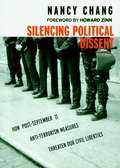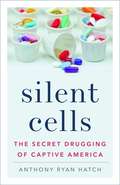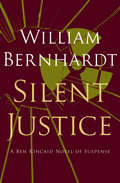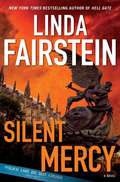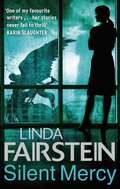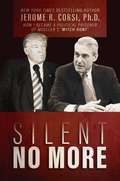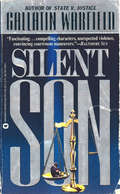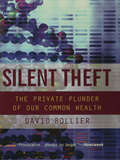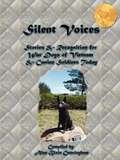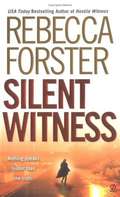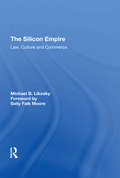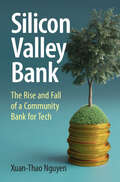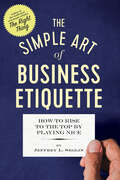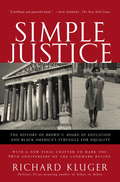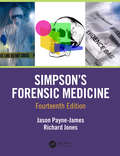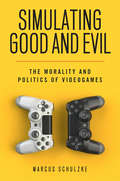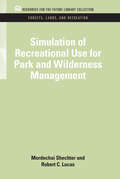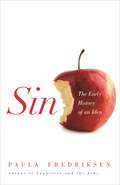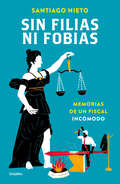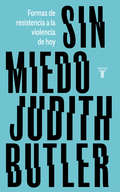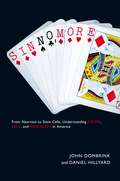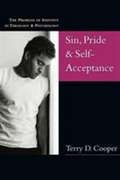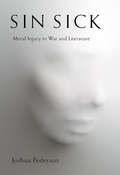- Table View
- List View
Silencing Political Dissent: How Post-September 11 Anti-terrorism Measures Threaten Our Civil Liberties (Open Media Series)
by Nancy ChangIn her groundbreaking new book, Silencing Political Dissent, constitutional expert Nancy Chang examines how the Bush administration's fight against terrorism is resulting in a disturbing erosion of First Amendment rights and increase of executive power.Chang's compelling analysis begins with a historical review of political repression and intolerance of dissent in America. From the Sedition Act of 1798, through the Smith Act of the 1940s and the internment of Japanese Americans in World War II, to the FBI's infamous COINTELPRO program of the 1960s, Chang recalls how during times of crisis and war, the U.S. government has unjustly detained individuals, invaded personal privacy, and hampered the free speech of Americans.Chang's expertise as a senior constitutional attorney shines through in the power and clarity of her argument. Meticulously researched and footnoted, Chang's book forces us to challenge the government when it is unpopular to do so, and to consider that perhaps "our future safety lies in the expansion, rather the contraction, of the democratic values set forth in the Constitution."
Silent Cells: The Secret Drugging of Captive America
by Anthony Ryan HatchA critical investigation into the use of psychotropic drugs to pacify and control inmates and other captives in the vast U.S. prison, military, and welfare systemsFor at least four decades, U.S. prisons and jails have aggressively turned to psychotropic drugs—antidepressants, antipsychotics, sedatives, and tranquilizers—to silence inmates, whether or not they have been diagnosed with mental illnesses. In Silent Cells, Anthony Ryan Hatch demonstrates that the pervasive use of psychotropic drugs has not only defined and enabled mass incarceration but has also become central to other forms of captivity, including foster homes, military and immigrant detention centers, and nursing homes. Silent Cells shows how, in shockingly large numbers, federal, state, and local governments and government-authorized private agencies pacify people with drugs, uncovering patterns of institutional violence that threaten basic human and civil rights. Drawing on publicly available records, Hatch unearths the coercive ways that psychotropics serve to manufacture compliance and docility, practices hidden behind layers of state secrecy, medical complicity, and corporate profiteering.Psychotropics, Hatch shows, are integral to &“technocorrectional&” policies devised to minimize public costs and increase the private profitability of mass captivity while guaranteeing public safety and national security. This broad indictment of psychotropics is therefore animated by a radical counterfactual question: would incarceration on the scale practiced in the United States even be possible without psychotropics?
Silent Justice (The Ben Kincaid Novels #9)
by William BernhardtAn attorney crusades against an industrial giant while a serial killer terrorizes Tulsa in this legal thriller that delivers &“fresh, often witty dialogue&” (Publishers Weekly). Leukemia is a terrible disease but also, thankfully, a rare one. So why have eleven children from a suburb outside of Tulsa have perished from this horrible illness in the last few years? The children&’s parents blame Blaylock Industrial, a massive corporation whose factory lies just outside of their bucolic small town, but they have no proof beyond gut instinct—and the terrible certainty that comes with the grief of losing a child. To prove such a spectacular claim could cost millions, and no law firm is willing to take on such an expense. That is, until the parents meet Ben Kincaid. An idealistic young attorney with a shoestring practice on the rough side of Tulsa, Kincaid is nearly broke when he brings the case against Blaylock and its army of lawyers. But though the odds are stacked against him, Kincaid will risk everything to win a settlement and make sure that no more children die.
Silent Justice (The Ben Kincaid Novels #9)
by William BernhardtAn attorney crusades against an industrial giant while a serial killer terrorizes Tulsa in this legal thriller that delivers &“fresh, often witty dialogue&” (Publishers Weekly). Leukemia is a terrible disease but also, thankfully, a rare one. So why have eleven children from a suburb outside of Tulsa have perished from this horrible illness in the last few years? The children&’s parents blame Blaylock Industrial, a massive corporation whose factory lies just outside of their bucolic small town, but they have no proof beyond gut instinct—and the terrible certainty that comes with the grief of losing a child. To prove such a spectacular claim could cost millions, and no law firm is willing to take on such an expense. That is, until the parents meet Ben Kincaid. An idealistic young attorney with a shoestring practice on the rough side of Tulsa, Kincaid is nearly broke when he brings the case against Blaylock and its army of lawyers. But though the odds are stacked against him, Kincaid will risk everything to win a settlement and make sure that no more children die.
Silent Mercy (Alex Cooper, Book #13)
by Linda FairsteinIn the latest thriller in Linda Fairstein's bestselling series, Alex Cooper dives deep into the byzantine, sinister world of New York City's powerful religious institutions. It's the middle of the night. Prosecutor Alexandra Cooper is called to Harlem's Mount Neboh Baptist Church, a beautiful house of worship originally built as a synagogue. But the crowd gathered there isn't interested in architecture, or even prayer. They've come for the same reason Alex has: to find out why the body of a young woman has been decapitated, set on fire, and left burning on the church steps. The only identifiable artifact on the charred remains is the imprint of a Star of David necklace seared into the victim's flesh. Alex wonders if the fire was meant to destroy this woman's body, or to draw attention to it. Her fears are confirmed days later, when a second corpse is found at a cathedral in Little Italy. The killings look like serial hate crimes, but the apparent differences in the victims' beliefs seem to eliminate a religious motive. Convinced that another young woman is bound to die, Alex mines the depths of Manhattan's many houses of worship to find a connection between the victims-and in the process uncovers a terrible and perilous truth that takes her far beyond the scope of her investigation, and directly into the path of terrible danger.
Silent Mercy (Alexandra Cooper #13)
by Linda FairsteinWhen the burnt headless body of a young woman is found on the steps of a Baptist Church in Harlem, Assistant DA Alexandra Cooper is one of the first on the shocking scene. Alex has seen some gruesome crimes committed in New York, but the barbarity of this latest discovery leaves her nauseous.With NYPD cop Mike Chapman, Alex begins to investigate, but before long another woman is slaughtered and found on the steps of a Catholic church in Little Italy; her throat slashed and her tongue cut out.It becomes clear there is a zealous serial killer on the loose. Now Alex and Mike must keep one step ahead of a religious fanatic bent on silencing the women he believes are bringing shame to his beliefs - before he kills anyone else.
Silent No More: How I Became a Political Prisoner of Mueller’s “Witch Hunt”
by Jerome R. CorsiA Simon & Schuster eBook. Simon & Schuster has a great book for every reader.
Silent Son
by Gallatin WarfieldA young boy is in danger after he witnesses a double murder in this courtroom mystery.
Silent Theft: The Private Plunder of Our Common Wealth
by David Bollier'They hang the man and flog the woman That steal the goose from off the common, But let the greater villain loose That steals the common from the goose.' - Traditional nursery rhyme Until a 1998 federal court decision, a Minnesota publisher claimed to own every federal court decision, including Roe v. Wade and Brown v. Board of Education. A Texas c
Silent Voices: Stories and Recognition for War Dogs of Vietnam and Canine Soldiers Today
by Alan Blain CunninghamStories and drawings of valiant war dogs. This compilation of pieces mainly follows the author's attempts to get a commemorative postage stamp for military war dogs and a memorial. [Poorly edited, errors left in place due to copyright laws.]
Silent Witness
by Rebecca ForsterThe inimitable defense attorney Josie Baylor-Bates returns to defend the man she loves from the charge of murdering his own disabled stepson. Walking the fine line between lover and lawyer, trust and truth, Josie will have to race against time to prove someone is framing her client-until she finds out that the last, silent witness is the most dangerous of all.
The Silicon Empire: Law, Culture and Commerce (Law, Justice, And Power Ser.)
by Michael B. LikoskyMichael Likosky examines the continuities and discontinuities between colonial and present-day high tech transnational legal orders. His concern is specifically with the colonial characteristics of the legal order which underpins the global high tech economy. He distinguishes the democratic and human rights rhetoric of this economy from a reality wherein the legal order is often used to reproduce colonial-type relationships. Just as in the colonial period, the expansion of trans-border commerce overlaps with democratic demands and human rights in complex, multifaceted and paradoxical ways. Through a case study looking at Malaysia's Multimedia Super Corridor, a high tech national development plan and foreign direct investment scheme, he examines how the transnational leaders of the high tech economy along with the Malaysian political elite react when human rights problems threaten to derail commercial plans.
Silicon Valley Bank: The Rise and Fall of a Community Bank for Tech
by Xuan-Thao NguyenThis book provides a first-hand account of the founding, ascent, and dissolution of Silicon Valley Bank (SVB), a tech community bank founded in 1982 with US$5 million that became the nation's 13th largest bank and tech industry's lender and bank. In this pathbreaking work, which challenges conventional understanding of risky tech lending by showing how an independent community bank became the go-to bank for the tech industry in the United States, Xuan-Thao Nguyen includes interviews with key players, ranging from the original founders and early employees to the current CEO of SVB. Chapters explore how the relationship between the venture capital (VC) industry and SVB transformed the way commercial banks comply with banking regulators while lending and nurturing young tech clients. The book demonstrates why the relationships between investors, start-ups, bankers, lenders, experts, lawyers, regulators, and community leaders are key ingredients for ongoing innovation in the tech industry. The book concludes with the sobering dissection of SVB's sudden death by $142 billion cuts inflicted by tech bros, social media, and the Federal Reserve Bank's successive interest rate hikes to squash the overheated economy.
The Simple Art of Business Etiquette: How to Rise to the Top by Playing Nice
by Jeffrey L. SeglinClimb the Corporate Ladder Without Stepping on Others From ethics columnist and Harvard lecturer Jeffrey L. Seglin, discover practical tips for succeeding professionally by succeeding socially. Practicing business etiquette doesn't mean pretending to be someone you're not. Brimming with practical, up-to-date tips on minding your business manners, The Simple Art of Business Etiquette guides you through the tricky territory of office etiquette with real-life stories and workplace scenarios. Become attuned to body language (Don't gawk at others during meetings or at any other time. It's creepy.) Engage in thoughtful introductions (Don't guess at someone's name if you don't remember it.) Practice proper e-mail etiquette (Do you really want to be the jerk who sends annoying e-mails around the office?) Curtail office conflicts (Never punch anyone in the workplace. Never.) Exhibit workplace sensitivity (Listen to your coworkers without cutting them off). Plus, decode the 15 most commonly-used phrases in business. The Simple Art of Business Etiquette proves that minding your manners goes a long way toward successfully advancing your career.
Simple Justice: The History of Brown v. Board of Education and Black America's Struggle for Equality
by Richard KlugerSimple Justice is the definitive history of the landmark case Brown v. Board of Education and the epic struggle for racial equality in this country. Combining intensive research with original interviews with surviving participants, Richard Kluger provides the fullest possible view of the human and legal drama in the years before 1954, the cumulative assaults on the white power structure that defended segregation, and the step-by-step establishment of a team of inspired black lawyers that could successfully challenge the law. Now, on the fiftieth anniversary of the unanimous Supreme Court decision that ended legal segregation, Kluger has updated his work with a new final chapter covering events and issues that have arisen since the book was first published, including developments in civil rights and recent cases involving affirmative action, which rose directly out of Brown v. Board of Education.From the Trade Paperback edition.
Simple Recipes for Joy
by Sharon GannonMore than 200 delicious vegan recipes from the world-renowned founder of the Jivamukti yoga method and the New York City Jivamuktea Café Since 1984, Jivamukti yoga has been synonymous with a new way of living: peacefully, healthfully, and consciously. Jivamukti's dedicated instructors and message of kindness have inspired a global revolution. In 2006, Sharon Gannon and David Life opened the Jivamuktea Café to complement their yoga school as a living expression of how compassionate spiritual activism can be put to practical use. It, too, was an immediate success. The peaceful ambiance, the camaraderie, and, most of all, the delicious, hearty fare struck a chord with patrons who were thrilled to eliminate meat and dairy from their diet without sacrificing taste. Thousands of customers--including Russell Simmons, award-winning film director Darren Aronofsky, and Eco Spokesmama Chloé Jo Davis--have become devoted fans of Gannon's cruelty-free burritos, chocolate mousse, and flower salads. Now, for the first time, Gannon presents the secrets behind the café's acclaimed menu--and also showcases her own home cooking, with recipes she's been making for family and friends for decades. Stalwart vegans--as well as the millions of vegetarians and omnivores who eat vegan part-time for its health and environmental benefits--will embrace Gannon's accessible, delicious, and spiritually powerful recipes.
Simpson's Forensic Medicine, 14th Edition
by Jason Payne-James and Richard JonesPrestigious and authoritative, this fully updated fourteenth edition of Simpson's Forensic Medicine remains a classic; one of the world's leading introductory texts in the field of forensic medicine. It presents all that the generalist or student needs to know about the interface between medicine and the law.
Simulating Good and Evil: The Morality and Politics of Videogames
by Marcus SchulzkeSimulating Good and Evil shows that the moral panic surrounding violent videogames is deeply misguided, and often politically motivated, but that games are nevertheless morally important. Simulated actions are morally defensible because they take place outside the real world and do not inflict real harms. Decades of research purporting to show that videogames are immoral has failed to produce convincing evidence of this. However, games are morally important because they simulate decisions that would have moral weight if they were set in the real world. Videogames should be seen as spaces in which players may experiment with moral reasoning strategies without taking any actions that would themselves be subject to moral evaluation. Some videogame content may be upsetting or offensive, but mere offense does not necessarily indicate a moral problem. Upsetting content is best understood by applying existing theories for evaluating political ideologies and offensive speech.
Simulation of Recreational Use for Park and Wilderness Management (RFF Forests, Lands, and Recreation Set)
by Mordechai Schechter Robert C. LucasFirst Published in 2011. Routledge is an imprint of Taylor & Francis, an informa company.
Sin: The Early History of an Idea
by Paula FredriksenWhy the meaning of sin changed radically during the first centuries of ChristianityAncient Christians invoked sin to account for an astonishing range of things, from the death of God's son to the politics of the Roman Empire that worshipped him. In this book, award-winning historian of religion Paula Fredriksen tells the surprising story of early Christian concepts of sin, exploring the ways that sin came to shape ideas about God no less than about humanity.Long before Christianity, of course, cultures had articulated the idea that human wrongdoing violated relations with the divine. But Sin tells how, in the fevered atmosphere of the four centuries between Jesus and Augustine, singular new Christian ideas about sin emerged in rapid and vigorous variety, including the momentous shift from the belief that sin is something one does to something that one is born into. As the original defining circumstances of their movement quickly collapsed, early Christians were left to debate the causes, manifestations, and remedies of sin. This is a powerful and original account of the early history of an idea that has centrally shaped Christianity and left a deep impression on the secular world as well.
Sin filias ni fobias: Memorias de un fiscal incómodo
by Santiago NietoLa historia más indignante que pueda imaginarse: un fiscal vapuleado por hacer su trabajo. En 2015, Santiago Nieto recibió un encargo claro: investigar los delitos electorales. Pero cuando lo hizo a profundidad, la maquinaria gubernamental lo embistió brutalmente. En este documento histórico, el extitular de la Fiscalía Especializada para la Atención de Delitos Electorales explica, con todo detalle, quiénes se incomodaron con su labor, por qué lo acosaron y los casos que desataron la persecución: Odebrecht, Estado de México, Veracruz, Chiapas... En Sin filias ni fobias, Santiago Nieto evidencia la lógica y la podredumbre que, hasta ahora, ha campeado en buena parte de las instituciones mexicanas... y que ahora a él le toca combatir.
Sin miedo: Formas de resistencia a la violencia de hoy
by Judith Butler«La violencia que vemos es una reacción frente a los progresos que hemos hecho, y eso significa que debemos seguir avanzando y aceptar que se trata de una lucha continuada, una lucha en la que los principios están de nuestro lado.» Judith Butler, una de las filósofas más reconocidas del mundo por sus contribuciones al feminismo, a la defensa de los derechos humanos y al pensamiento político, rastrea, en este nuevo libro, las formas de resistencia a las múltiples modalidades de violencia -desde la tortura por razones políticas, los crímenes contra mujeres, hasta la decisión de negar los horrores del pasado, el desprecio contra los migrantes o la desigualdad global- que caracteriza a nuestras sociedades contemporáneas. Sin miedo recoge una serie de conferencias recientes de la autora sobre justicia, memoria, duelo, crítica y disidencia, en las que formula, además de sus inestimables reflexiones filosóficas, un conjunto de herramientas conceptuales con las que repensar la resistencia ante cualquier forma de opresión. Judith Butler, autora de reconocidos ensayos de pensamiento político como Marcos de guerra, Dar cuenta de sí mismo y Vida precaria, vuelve en este nuevo libro a pensar y repensar en las formas de resistencia a las múltiples modalidades de violencia. A partir de sus más recientes conferencias, Contra la violencia es un conjunto de reflexiones sobre justicia, memoria, duelo y lamento, crítica y disenso que ofrece, además de sus inestimables reflexiones filosóficas, un conjunto de herramientas conceptuales con las cuales resignificar la resistencia a toda forma de subyugación.
Sin No More: From Abortion to Stem Cells, Understanding Crime, Law, and Morality in America
by John Dombrink Daniel HillyardRead the Authors' Op-Ed on the Seattle Post-IntelligencerSin No More offers a vivid examination of some of the most morally and politically disputed issues of our time: abortion, gay rights, assisted suicide, stem cell research, and legalized gambling. These are moral values issues, all of which are hotly, sometimes violently, contested in America. The authors cover these issues in depth, looking at the nature of efforts to initiate reforms, to define constituencies, to mobilize resources, to frame debates, and to shape public opinion—all in an effort to achieve social change, create, or re-write legislation. Of the issues under scrutiny only legalized gambling has managed to achieve widespread acceptance despite moral qualms from some.Sin No More seeks to show what these laws and attitudes tell us about Americans’ approach to law and morality, and about our changing conceptions of sin, crime and illegality. Running through each chapter is a central tension: that American attitudes and laws toward these victimless crimes are going through a process of normalization. Despite conservative rhetoric the authors argue that the tide is turning on each of these issues, with all moving toward acceptance, or decriminalization, in society. Each issue is at a different point in terms of this acceptance, and each has traveled different roads to achieve their current status.
Sin, Pride and Self-Acceptance: The Problem of Identity in Theology and Psychology
by Terry D. CooperWhat is at the root of the problem of humanity? Is it pride or lack of self-esteem?Do we love ourselves too much or too little?The debate about the human condition has often been framed this way in both theological and psychological circles. Convictions about preaching, teaching, marriage and child rearing, as well as politics, social welfare, business management and the helping professions, more often than not, fall on one side or the other of this divide. With theological and psychological insight Terry D. Cooper provides trenchant analysis of this centuries-long debate and leads us beyond the usual impasse. Humanistic psychology has often regarded traditional Christianity as its archrival in assessing the human condition. Cooper demonstrates how the Christian doctrine of a sinful and fallen humanity sheds light on the human condition which exhibits both pride and self-denigration. Bringing theological insights ranging from Augustine and John Calvin to Reinhold Niebuhr together with the psychological theories of Freud, Jung, Carl Rogers, Gerald May and Karen Horney, Cooper guides readers through the maze of competing claims to a resolution which affirms Christian conviction while critically engaging modern psychological theory. A model of the proper integration of Christian theology and the discipline of psychology,Sin, Pride & Self-Acceptance will be of special help to students and practitioners of psychology, pastoral counseling and clinical psychology.
Sin Sick: Moral Injury in War and Literature
by Joshua PedersonIn Sin Sick, Joshua Pederson draws on the latest research about identifying and treating the pain of perpetration to advance and deploy a literary theory of moral injury that addresses fictional representations of the mental anguish of those who have injured or killed others. Pederson's work foregrounds moral injury, a recent psychological concept distinct from trauma that is used to describe the psychic wounds suffered by those who breach their own deeply held ethical principles.Complementing writings on trauma theory that posit the textual manifestation of trauma as absence, Sin Sick draws argues that moral injury appears in literature in a variety of forms of excess. Pederson closely reads works by Dostoevsky (Crime and Punishment), Camus (The Fall), and veterans of the wars in Iraq and Afghanistan (Brian Turner's Here, Bullet; Kevin Powers' The Yellow Birds; Phil Klay's Redeployment; and Roy Scranton's War Porn), contending that recognizing and understanding the suffering of perpetrators, without condoning their crimes, enriches the experience of reading—and of being human.
